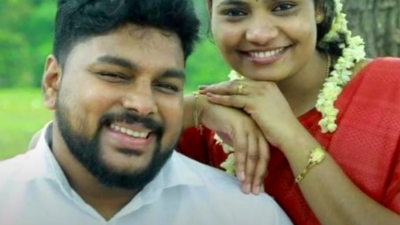India’s Kerala High Court has dismissed a petition filed by a Christian father over his daughter’s marriage to a Muslim.
Joisna Mary Joseph, 26, a nurse who works in Saudi Arabia, married Shejin M, a Communist Party of India worker from Alappuzha, in the southern Indian state of Kerala, without her parents' approval, on April 12.
The marriage created a storm in the coastal state after the bride's relatives accused Mr Shejin of abducting Ms Joseph.
But she denied this, saying: “I married the person I loved, so I wanted to go with him.”
Her father had approached police with a complaint of abduction.
After failing to get help from officers, he filed a habeas corpus petition in the court, alleging his daughter had been taken away against her will and illegally detained.
Habeas corpus is a recourse in law that orders a person who has detained another person to produce them before the court.
The high court summoned Ms Joseph on Tuesday and dismissed the petition after she said she had married of her own free will.
“We have interacted with the [detainee]. She categorically states that she has decided to interact with Shejin of her own free will and not under any sort of compulsion,” the court order said.
“Taking note of the categorical stance of the [detainee] and being convinced that there is no illegal detention, the petition is closed.”
Nuns join protests in Kerala
Earlier this month, Ms Joseph had visited her home town to become engaged to another man — which had been arranged by the family.
But she had already been in a relationship with Mr Shejin for seven months, and left her parents to marry him. This took place under the Special Marriage Act, which allows couples of different faiths to have a civil wedding without either having to convert to the other's religion.
Some Christians in Kerala, including nuns, protested against the marriage. About 18 per cent of the state's population are Christians.
“I married the person I loved so I wanted to go with him. I liked him and started living with him. I told the court about my decision,” Ms Joseph told local media.
Kerala's courts have dealt with similar cases in the past. In 2018, in the Hadiya case, the Supreme Court restored the marriage of a Muslim man and a woman who had been born a Hindu.
It overruled a Kerala High Court order that had annulled the marriage of Hadiya and Shafin Jehan, a Muslim man.
Hadiya was born as Akhila Ashokan and had converted to Islam before meeting Mr Jehan. But her father had claimed that she was “brainwashed” and had challenged the marriage.
Eight states ruled by Prime Minister Narendra Modi’s Bharatiya Janata Party have criminalised interfaith marriages through “anti-conversion” laws barring religious conversion for marriages.


